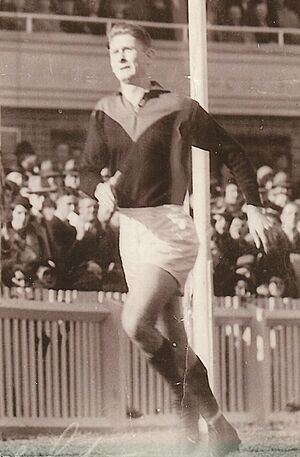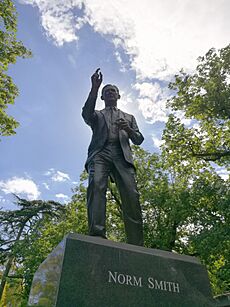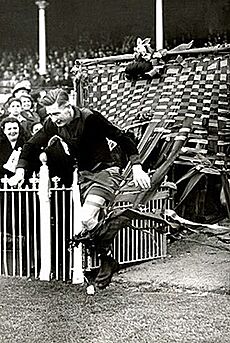Norm Smith facts for kids
Quick facts for kids Norm Smith |
|||
|---|---|---|---|

Norm Smith playing for Melbourne, c. 1940s
|
|||
| Personal information | |||
| Nickname(s) | The Red Fox | ||
| Date of birth | 21 November 1915 | ||
| Place of birth | Clifton Hill, Victoria, Australia | ||
| Date of death | 29 July 1973 (aged 57) | ||
| Place of death | Pascoe Vale, Victoria, Australia | ||
| Original team | Northcote juniors | ||
| Position(s) | Full-forward | ||
| Career highlights | |||
|
Player
Coach
Overall
|
|||
Norman Walter Smith (born 21 November 1915 – died 29 July 1973) was a famous Australian rules football player and coach. He played in the Victorian Football League (VFL). Norm Smith played over 200 games for the Melbourne and Fitzroy clubs. After playing, he became a coach for twenty years. Fifteen of those years were spent coaching Melbourne.
Norm Smith is considered a "Legend" in the Australian Football Hall of Fame. Many people think he was one of the greatest and most important coaches ever. He was also one of the best full-forwards of his time. Like the famous Collingwood coach Jock McHale, Smith was great at taking young players and turning them into a strong, disciplined team.
Norm and his brother Len were very creative with their game plans. This had a big impact on Australian rules football. One of his most famous students was Ron Barassi. Norm Smith won four championships (called premierships) as a player with Melbourne. Then, as a coach, he led the club to six more premierships in the 1950s and 1960s.
However, he was surprisingly fired in the middle of the 1965 season. At that time, Melbourne was the reigning champion team. This event led to something called the "Curse of Norm Smith." People believed this curse meant Melbourne would not win another premiership for a long time. The supposed curse lasted 57 years until Melbourne won the 2021 AFL Grand Final. In 1996, Norm Smith was chosen as the coach for the AFL Team of the Century.
Contents
Norm Smith's Early Life
Norm Smith and his older brother Len were the sons of Victor Smith, who worked with iron. Their mother was Ethel May. Norm went to Westgarth Central School. After school, he learned to be an engineer and worked at a rope factory.
In 1943, he took over his father's engineering business. He later moved it to North Coburg in 1954. On 19 October 1940, he married Marjorie Victoria Ellis in Melbourne. They had one child, a son named Peter, who was born in 1947.
Norm Smith's Playing Days
Norm Smith was a very talented athlete when he was young. He played both top-level district cricket and Australian football. His first football club was Dennis, where his brother Len had also started. When scouts from the VFL club Melbourne came to sign Len, Norm's father suggested they also look at young Norm.
Melbourne was trying to build a strong new team. Norm Smith played his first game in 1935 under the famous coach Frank 'Checker' Hughes. Interestingly, Norm's career took off at Melbourne, but Len didn't get a regular spot. Len later moved to other clubs to continue his career.
Becoming a Star Player
By 1937, Norm Smith was a regular player for Melbourne. He usually played as a full-forward. Smith quickly learned to play well with his teammate Ron Baggott. He became known as a smart, "thinking" player. He liked to pass the ball to teammates in better positions. He also used quick handballs and helped clear the way for teammates with the ball.
One writer said he "could make a forward line work around him." This showed he was a true team player. The Melbourne team was getting better quickly. They played in the finals in 1936 and 1937 but lost both times. In 1938, they finished fifth, but by 1939, they looked like the team to beat.
Under coach Hughes, Melbourne became a more professional team. Smith was one of many skilled players who followed Hughes' ideas. The team, now called the Red Demons, went into the 1939 finals with a strong attacking style. Smith was key to their success. In the Grand Final against Collingwood, Melbourne scored a record number of points. They won their third premiership in 39 years.
They won another championship in 1940, with Smith being the star. He scored seven goals in that Grand Final. The next year, the team won their third premiership in a row. This was amazing, even with players missing due to war and injuries. Smith had his best season and was the VFL's top goal scorer that year. He kept playing during the war years for a Melbourne team that had fewer players. In 1944, Smith won The Herald newspaper's award for best player.
Captain and the "Miracle of '48"
Norm Smith became the captain of the Melbourne club in 1945. He led the Demons to their first Grand Final loss in 1946. Because of poor performance and losing confidence, Smith gave up the captaincy for 1948. It seemed his career might be ending at age 32.
Melbourne was badly beaten by Essendon in a semi-final. It seemed very unlikely they would win the premiership. But, in a surprising turn of events, a retired champion player named Jack Mueller was brought back to the team. In the next three games, which included a tied Grand Final that had to be replayed, Smith and Mueller worked together. They scored many goals and led the Demons to an unexpected premiership.
Coach 'Checker' Hughes decided this was the perfect way to end his long career and retired. Smith was very keen to become the new coach.
Norm Smith's Coaching Career
To Smith's disappointment, the club committee chose Allan LaFontaine as coach by just one vote. Smith really wanted to start coaching. So, he made the tough decision to move to Fitzroy as a captain-coach. His older brother Len was already there, coaching the Under 19's team.
Smith only played seventeen games for Fitzroy before he stopped playing in 1950. His time at Fitzroy was okay; the team was competitive but didn't make the finals. Meanwhile, Melbourne was struggling, and LaFontaine resigned after three years. So, in 1952, Smith returned to Melbourne as coach.
With some of the best players in the club's history joining the team, Smith and Melbourne became very dominant. They controlled the VFL for ten years. During this time, the club won six premierships: 1955, 1956, 1957, 1959, 1960, and 1964.
Smith's Coaching Style
Smith was very strict about team discipline. People called him the 'Demon Dictator' and the 'Martinet of Melbourne'. His cleverness and red hair earned him another nickname: the 'Red Fox'. Smith built his success on strong team spirit. He created close-knit teams during Melbourne's great years. Other clubs wanted to copy his methods.
Norm and Len Smith (who coached Fitzroy from 1958 to 1962) helped change football. They encouraged a faster, more attacking style of play. Melbourne teams under Smith were quick, disciplined, fit, and confident. The only real slip in discipline happened in the 1958 Grand Final. Melbourne was trying to win four premierships in a row. But a very determined Collingwood team managed to make the Demons lose their focus.
The Famous Dismissal
From 1964, problems started between Smith and some important people at Melbourne. One reason was that Melbourne's star player, Ron Barassi, decided to move to Carlton in 1965 to be a captain-coach. Barassi had lived with Smith and his wife since he was 15. Barassi became like a student to Smith, and they had a special bond.
Smith supported Barassi's dream to coach. He even offered to step aside so Barassi could coach Melbourne. But Barassi chose to go to Carlton. Some Melbourne officials unfairly blamed Smith, saying he was getting rid of a possible rival. Another problem was Smith's sometimes harsh way of speaking. He sometimes criticized committee members he felt were interfering. This led to a difficult situation when an umpire sued Smith for saying bad things about him. When Smith had to defend himself, the club leaders did not support him.
Finally, the situation exploded on a Friday night before a game in 1965. A messenger delivered a letter to Smith at his home, saying he was fired. When the news got out, it caused a huge sensation. It was one of the most dramatic news stories in Australian football history. Smith appeared on television on Sunday, looking very emotional. People thought he might go coach Richmond, where his brother Len was ill.
Even though he was hired back within a week, his relationship with the club was never the same. The Demons only won one more game that year and missed the finals for the first time in eleven years. In just a few dramatic months, Melbourne's strong position was gone. The Demons would not make the finals again until 1987. Melbourne finally won the 2021 Grand Final.
A Short Return to Finals
After two more disappointing seasons, Norm Smith had heart disease. He had to resign from Melbourne at the end of 1967. It was a sad year for the Smith family. His brother Len had died from a heart attack just months before his team, Richmond, won the premiership.
Feeling better, Smith surprised many people by agreeing to coach South Melbourne in 1969. At Albert Park, Smith achieved one of his best coaching performances. He led the struggling Swans to the 1970 semi-final. This was their first finals appearance since 1945. However, the Swans didn't have enough resources or confidence to keep up the effort. They finished last and second last in the next two years. Smith resigned after the 1972 season.
Norm Smith's Death and Legacy

Norm Smith was only 57 years old when he died from a brain tumor at his home on 29 July 1973. His wife and son survived him.
Smith had a huge impact on Australian football. He made the coach's role much more important. For example, in 1955, he started using a runner to send messages to his players during games. He also made fitness and team discipline much higher. This helped lead to the "running game" style of play in the 1970s.
Sometimes, his direct way of speaking and not tolerating foolishness led to arguments. But everyone admired and respected him for his smart ideas about the game. He always believed that teamwork was the most important thing. Even though he was known as a great speaker and a tough leader, he was a quiet and private person away from football. He played and coached mostly because he loved the game. He did more than almost anyone else to help the sport grow from a semi-professional game.
In the 1970s, Smith's son Peter played for Melbourne and Carlton in the VFL. He also played for Coburg in the VFA as a full-forward. He was Coburg's top goal scorer for one season.
On 19 July 2007, Norm Smith was officially recognized as a "Legend" in the Australian Football Hall of Fame.
Norm Smith Medal and Memorial Trophy
See main article: Norm Smith Medal
In 1979, the VFL created the Norm Smith Medal. This award is given to the best player in the Grand Final. The first person to win it was Norm Smith's great-nephew, Wayne Harmes, who played for Carlton. He received the medal from Norm's wife, Marj.
Besides the Norm Smith Medal, there is also the Norm Smith Memorial Trophy. This is a Coaches Award given to the player who best shows hard work and good preparation.
 | George Robert Carruthers |
 | Patricia Bath |
 | Jan Ernst Matzeliger |
 | Alexander Miles |


